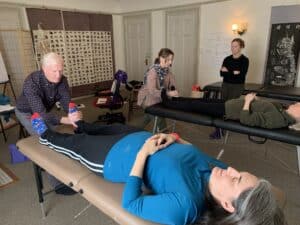Prevention and Treatment with Nutrition for Menopause
Menopause, the permanent end of menstruation, is a natural transition in every woman’s life. Nutrition for menopause can help prepare the body for changes that come with age. Better nutrition in the years leading up to menopause (called “peri-menopause”) can help every woman sail through this time of shifting hormones, both preventing problems and helping relieve uncomfortable symptoms that may occur. Nutrition for menopause helps your body find a new balance more easily. Moreover, better nutrition for menopause and beyond (post-menopause) prepares the body for optimal aging, allowing a woman to remain healthy and resilient through the end of her life.
Menopause brings both physical changes in the body and shifts in personal identity, as women move beyond the roles of child-bearing and child-rearing. Peri-menopause can last for several years. Triggered by changes in hormone levels, most women experience some symptoms as body and mind find a new balance. Common complaints include hot flashes and night sweating, irritability, anxiety, insomnia, fatigue, depression, memory changes, and irregular or heavy periods.
It’s important to remember that menopause is a natural process. If the body has what it needs to regain balance, symptoms will resolve on their own. Good nutrition for menopause, part of a healthy lifestyle, gives the body what it needs.
What About Hormone Replacement Therapy?
Conventional western medicine offers hormone replacement therapy (HRT) to relieve the discomfort of peri-menopause. There are some significant drawbacks to HRT:
- It masks the symptoms, but does not address the underlying cause.
- It working against the body and not with it, preventing the natural course of life change.
- It can create imbalances in other areas of the body, leading to further abnormalities.
- It leads to a higher risk of serious side effects, including stroke, cancer and more.
Add in Exercise and Sunshine
Fortunately, there are many natural options to support a woman through the discomforts around menopause, as well as the post-menopausal metabolic changes. Nutrition for menopause is part of the picture. Two other thing deserve special mention, before we jump into nutrition for menopause: exercise and sunshine.
Exercise needs to be at the top of the list for healthy menopause, as the metabolism slows down. Women approaching menopause are at higher risk for cardiovascular disease, type 2 diabetes, thyroid problems and other metabolic problems. Exercise not only helps to lower these risks, it has many other benefits. It boosts endorphin levels, improving mood and sleep. It helps build muscle mass, which prevents weight gain. It strengthens your bones, preventing osteoporosis. You look better and feel better with exercise.
Exercising outdoors has even more benefits. Body and mind are hard-wired to respond to the natural environment. Simply spending time outdoors helps to regulate the chemicals that run the endocrine, immune and neurological systems.
One of the most important and well-known benefits of time outdoors is sunshine. Exposure to sunlight, even on a cloudy day, is always the best way to boost Vitamin D. Your body can manufacture its own Vitamin D, in the proportions that it needs. Vitamin D has many wide-ranging effects that are important for nutrition for menopause. It helps the body build strong bones, plays a role in serotonin production (better moods), and is protective against cancer and many other chronic illnesses.
Nutrition for Menopause: Five Foods to Include
- Healthy Fats are crucial for balancing hormones and maintaining a healthy metabolism, which will help you keep a healthy weight. Healthy fats, including saturated fats, are the building blocks of hormones. They are also powerful anti-inflammatories. Beyond nutrition for menopause, healthy fats have widespread benefits for brain, heart and joint health. Some excellent dietary sources include coconut oil, olive oil, cod liver oil, wild-caught salmon, grass-fed meats, walnuts, flax seed, and avocado. (Cod liver oil has the added benefit of naturally-occurring Vitamin D, crucial for keeping bones strong.)
- Cruciferous vegetables (broccoli, kale, cabbage) contain compounds which help to naturally balance estrogen levels. They are also high in levels of other essential nutrients important for heart health, including fiber, Vitamin K, Vitamin C and electrolytes.
- High-fiber foods (nuts, seeds, legumes, vegetables, fruit, whole grains) help maintain a healthy weight and may help balance estrogen production. Fiber is important for digestive and cardiovascular health.
- Bone Broth is the “anti-aging food” that has many benefits for nutrition for menopause, and especially for bone health and joint health. It contains bioavailable minerals that are critical for bone building. It is also a rich source of collagen, which is key for bone architecture – the flexibility, strength and fracture-resistance of bones. Broth also helps normalize weight by supporting gut health. Nutrients in broth help repair the gut lining and feed beneficial bacteria in the gut.
- Probiotic foods (sauerkraut, kefir, kombucha, yogurt, tempeh, miso, apple cider vinegar ) contain beneficial bacteria that your body needs to maintain a healthy digestive tract. Probiotics aid in repairing the gut lining, which in turn helps balance hormone levels. A healthy gut helps prevent disease-causing inflammation that impacts the thyroid gland, in particular, and has other widespread metabolic effects.
Nutrition for Menopause: Three Foods to Avoid
- Manufactured vegetable oils (safflower, sunflower, corn, cottonseed, canola and soybean) are high in pro-inflammatory omega-6 fatty acids. Stick to the healthy oils discussed above.
- Refined carbohydrates (white flour, white rice, sugary foods) create inflammation in the body, which can disrupt hormone balance. A diet high in carbohydrates and lacking healthy fats also leads to weight gain.
- Added sugars, sugar substitutes (sucralose) and highly processed foods promote insulin resistance, high blood sugar and metabolic syndrome. Metabolic syndrome is linked to hot flashes during menopause.
Nutrition for Menopause and Beyond
Nutritious food is important at every life phase, but becomes even more critical as the body ages. Nutrition for menopause is also nutrition beyond menopause. The aging physical body needs more care to remain resilient and healthy. Most modern-day chronic illnesses are preventable, and often are the result of years of sedentary living and poor diet. Many illnesses can be avoided – and perhaps reversed – by eating a nutrient-dense whole foods diet.
Everyone wants to live a long and healthy life, not one with years of disability in old age. Optimal diet leads to optimal aging. Nutrition for menopause can be the gateway to a resilient and thriving elder life phase.
Inner Works Acupuncture, located in the Alphabet District of Portland, Oregon, offers acupuncture, Zero Balancing (body work), herbal medicine and whole foods nutrition for menopause and other health conditions. Call us today at 503-227-2127 to make an appointment.



